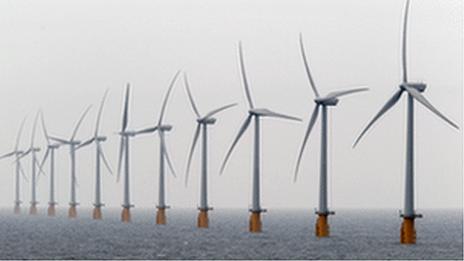East coast turbines: An 'excellent investment'?
- Published

Cheap green electricity has not happened after a decade of development
Wind power from turbines off the coast of East Anglia promised cheap "green" power and thousands of jobs a decade ago.
However, critics say that while the industry has expanded, households have been picking up the cost of subsidies.
Fewer jobs than expected have been created and mostly non-British companies have profited.
Scroby Sands, which opened in 2004 off Great Yarmouth, was England's first commercial offshore wind farm.
Michael Lewis of its owner, power company Eon, said the farm had been "an excellent investment", which had given the firm "the experience we needed to develop our offshore strategy further".
Since Scroby Sands opened, East Anglia has seen the development of several further farms off the coasts of Norfolk, Suffolk and Essex.
Often these have been built with blades made in Denmark, gearboxes and towers in Germany, foundations in the Netherlands and cabling in Italy or Norway.
'Extra costs'
Dr John Constable, from the Renewable Energy Foundation, a charity promoting sustainable development of renewable energy, said subsidies in the eastern region were "about £500m a year", a sum that would "increase as the industry develops".
"By 2020, we'll be looking at costs running into many billions of pounds a year, all coming out of consumer bills which will increase by a couple of hundred pounds."
Mr Lewis said that would not be the case and that his firm "fully expect the subsidy to reduce over time".
"As we get economies of scale, we'll drive to reduce the costs."
Dr Gordon Edge, from the renewable energy trade association RenewableUK, said there would be "extra costs whatever we do - either updating our existing infrastructure or investing in new low carbon technologies".
He added that while many compnents were originally made overseas, "we are finding that, increasingly, the content of projects is going to come from the UK".
"Up to now most of the turbines have been basically onshore machines made seaworthy in existing factories in places like Denmark and Germany.
"Factories for the next generation turbines haven't been built yet [and] we have the opportunity to have them in the UK."
The next decade will test whether the public is willing to stump up to keep the blades turning.
More on Inside Out East on BBC1 at 19:30 GMT on Monday 3 February.
- Published31 January 2014
- Published6 January 2014
- Published4 December 2013
- Published26 June 2013